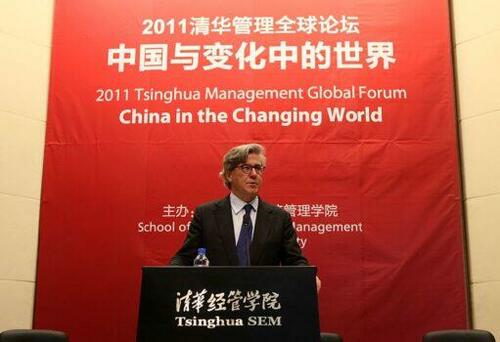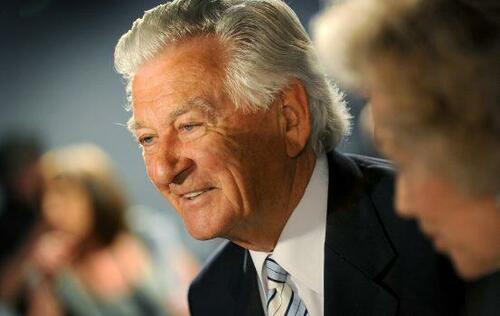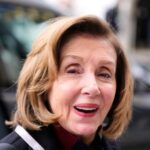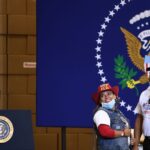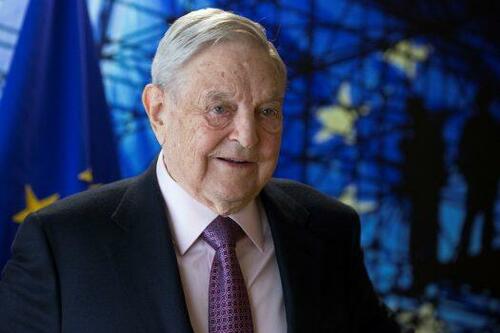
Authored by Daniel Teng via The Epoch Times,
Beijing’s highly secretive Ministry of State Security (MSS) leveraged and manipulated leading Western political and business elites to deepen the Chinese Communist Party’s influence around the world, according to a new book by Alex Joske, an expert on Chinese foreign interference.
The early pages of “Spies and Lies: How China’s Greatest Covert Operations Fooled the World” detail how billionaire George Soros, inspired by his work establishing the Open Society Foundation in post-communist Hungary, carried out similar work for China during Chinese leader Deng Xiaoping’s economic reform era.
The vehicle devised by Soros, and partner Liang Heng, was to establish the Fund for the Reform and Opening of China (the China Fund) to support cultural, business, and scientific research to assist with the country’s opening up, according to Joske, a senior analyst at the Australian Strategic Policy Institute.
Yet amid political manoeuvring between factions in the 1980s, the China Fund was forced to partner with the China International Culture Exchange Center (CICEC), an organisation claiming to be under the control of the Ministry of Culture.
George Soros, founder and chairman of the Open Society Foundations, arrives for a meeting in Brussels, Belgium, on April 27, 2017. (Olivier Hoslet/AFP/Getty Images)
Joske alleges that Soros and Liang soon discovered, however, that CICEC had its own motives for the China Fund, and that was to support political initiatives rather than activities associated with liberalising China.
Soros later closed the China Fund with CICEC co-chair Yu Enguang, revealed to be a “high-ranking official in the external police” or the MSS.
“The MSS seizure of the China Fund was an impressive display of the agency’s confidence in engaging with one of America’s best-connected and wealthiest men. What it learnt could be applied to future operations as the agency grew more aggressive and internationally focused over the following decade,” Joske wrote.
CICEC itself would continue to be a “custom-made organ” for meeting and secretly influencing recruits from around the world.
“Politically sensitive missions like engaging directly with George Soros or posing as liberals with the Party in order to gain the trust of foreigners are home turf for these officers,” he said.
Exploiting Ambition
Joske also notes that the MSS was very adept at exploiting the ambition of Western elites and cites the example of the former co-president of Goldman Sachs, John Thornton.
After quitting the banking giant, Thornton held several prominent positions with major Chinese institutions, including a directorship at the well-known Tsinghua University.
Journalist Josh Rogin alleged Thornton developed one of the “most reliable and high-level networks with the families that run the CCP,” which shaped Thornton’s views on how to manage China relations.
John L. Thornton, guest professor and director of Global Leadership Program at Tsinghua SEM and chairman of the board of the Brookings Institution, speaks during the 2011 Tsinghua Management Global Forum at Tsinghua SEM Auditorium in Beijing on Oct. 25, 2011. (VCG/VCG via Getty Images)
“Thornton’s beliefs about China’s future have been characterised by the same false narratives the MSS Social Investigation Bureau pushed on foreign scholars, diplomats, and elites. In 2008, he argued in an essay for Foreign Affairs magazine that the Party was actively considering moving towards democracy,” Joske wrote.
“Thornton’s writings reflect the same optimism about China that Party leaders and the MSS learnt to capitalise on decades earlier.”
The former Goldman Sachs executive went on to encourage the Trump administration to befriend Chinese leader Xi Jinping directly. Yet these efforts at diplomatic engagement with the Chinese leadership would eventually give way to tough sanctions on China to correct years of intellectual property theft and unbalanced trade.
Thornton, along with several major Wall Street figures, also allegedly attempted to sway the Biden administration on its China policy, but these efforts have also fallen to the wayside as scrutiny of the Chinese Communist Party becomes more widespread.
Exploiting a Love of China
Joske also draws attention to the Chinese regime’s use of people’s love for China outlining the example involving former Australian Labor Prime Minister Bob Hawke.
Hawke was distraught in the aftermath of the Tiananmen Square Massacre in 1989 and famously responded by granting 42,000 Chinese nationals’ asylum.
Joske says four years after the massacre, Hawke received a message from the Chinese consul in Sydney inviting him to visit China.
Former Prime Minister Bob Hawke in Brisbane, Australia, on Aug. 16, 2010. (William West/AFP/Getty Images)
Hawke felt it was important that Australia-China relations grew, so agreed to do so. There he was received and welcomed by then-Chinese leader Jiang Zemin and then-Premier Li Peng.
“The special bromance between Chinese and Australian leaders was back on track. Hawke thought the fate of [former Premier] Zhao Ziyang, who eventually died in house arrest, was ‘extremely sad,’ but the importance of building ties to the Party leadership came first,” Joske wrote.
He further added that the issue of Tiananmen was eventually “swept under the rug,” and Hawke would go on to play a valuable role in selling China to the rest of the world.
Authored by Daniel Teng via The Epoch Times,
Beijing’s highly secretive Ministry of State Security (MSS) leveraged and manipulated leading Western political and business elites to deepen the Chinese Communist Party’s influence around the world, according to a new book by Alex Joske, an expert on Chinese foreign interference.
The early pages of “Spies and Lies: How China’s Greatest Covert Operations Fooled the World” detail how billionaire George Soros, inspired by his work establishing the Open Society Foundation in post-communist Hungary, carried out similar work for China during Chinese leader Deng Xiaoping’s economic reform era.
The vehicle devised by Soros, and partner Liang Heng, was to establish the Fund for the Reform and Opening of China (the China Fund) to support cultural, business, and scientific research to assist with the country’s opening up, according to Joske, a senior analyst at the Australian Strategic Policy Institute.
Yet amid political manoeuvring between factions in the 1980s, the China Fund was forced to partner with the China International Culture Exchange Center (CICEC), an organisation claiming to be under the control of the Ministry of Culture.
George Soros, founder and chairman of the Open Society Foundations, arrives for a meeting in Brussels, Belgium, on April 27, 2017. (Olivier Hoslet/AFP/Getty Images)
Joske alleges that Soros and Liang soon discovered, however, that CICEC had its own motives for the China Fund, and that was to support political initiatives rather than activities associated with liberalising China.
Soros later closed the China Fund with CICEC co-chair Yu Enguang, revealed to be a “high-ranking official in the external police” or the MSS.
“The MSS seizure of the China Fund was an impressive display of the agency’s confidence in engaging with one of America’s best-connected and wealthiest men. What it learnt could be applied to future operations as the agency grew more aggressive and internationally focused over the following decade,” Joske wrote.
CICEC itself would continue to be a “custom-made organ” for meeting and secretly influencing recruits from around the world.
“Politically sensitive missions like engaging directly with George Soros or posing as liberals with the Party in order to gain the trust of foreigners are home turf for these officers,” he said.
Exploiting Ambition
Joske also notes that the MSS was very adept at exploiting the ambition of Western elites and cites the example of the former co-president of Goldman Sachs, John Thornton.
After quitting the banking giant, Thornton held several prominent positions with major Chinese institutions, including a directorship at the well-known Tsinghua University.
Journalist Josh Rogin alleged Thornton developed one of the “most reliable and high-level networks with the families that run the CCP,” which shaped Thornton’s views on how to manage China relations.
John L. Thornton, guest professor and director of Global Leadership Program at Tsinghua SEM and chairman of the board of the Brookings Institution, speaks during the 2011 Tsinghua Management Global Forum at Tsinghua SEM Auditorium in Beijing on Oct. 25, 2011. (VCG/VCG via Getty Images)
“Thornton’s beliefs about China’s future have been characterised by the same false narratives the MSS Social Investigation Bureau pushed on foreign scholars, diplomats, and elites. In 2008, he argued in an essay for Foreign Affairs magazine that the Party was actively considering moving towards democracy,” Joske wrote.
“Thornton’s writings reflect the same optimism about China that Party leaders and the MSS learnt to capitalise on decades earlier.”
The former Goldman Sachs executive went on to encourage the Trump administration to befriend Chinese leader Xi Jinping directly. Yet these efforts at diplomatic engagement with the Chinese leadership would eventually give way to tough sanctions on China to correct years of intellectual property theft and unbalanced trade.
Thornton, along with several major Wall Street figures, also allegedly attempted to sway the Biden administration on its China policy, but these efforts have also fallen to the wayside as scrutiny of the Chinese Communist Party becomes more widespread.
Exploiting a Love of China
Joske also draws attention to the Chinese regime’s use of people’s love for China outlining the example involving former Australian Labor Prime Minister Bob Hawke.
Hawke was distraught in the aftermath of the Tiananmen Square Massacre in 1989 and famously responded by granting 42,000 Chinese nationals’ asylum.
Joske says four years after the massacre, Hawke received a message from the Chinese consul in Sydney inviting him to visit China.
Former Prime Minister Bob Hawke in Brisbane, Australia, on Aug. 16, 2010. (William West/AFP/Getty Images)
Hawke felt it was important that Australia-China relations grew, so agreed to do so. There he was received and welcomed by then-Chinese leader Jiang Zemin and then-Premier Li Peng.
“The special bromance between Chinese and Australian leaders was back on track. Hawke thought the fate of [former Premier] Zhao Ziyang, who eventually died in house arrest, was ‘extremely sad,’ but the importance of building ties to the Party leadership came first,” Joske wrote.
He further added that the issue of Tiananmen was eventually “swept under the rug,” and Hawke would go on to play a valuable role in selling China to the rest of the world.
